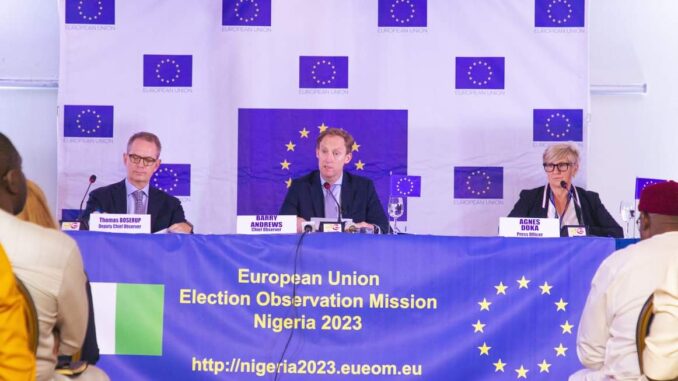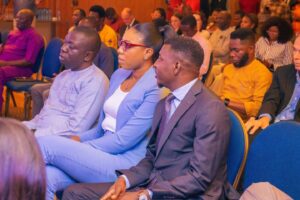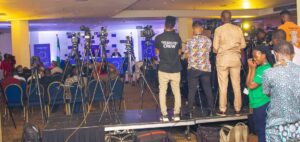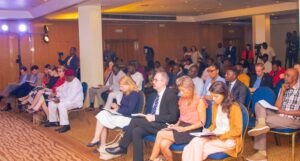
… Called for operational effectiveness in subsequent elections
By Divine Sam
The European Union Election Observation has commended Nigerians efforts towards commitment to democracy and also called for electioneering reforms system to enhance a more free, fair and transparent conduct in subsequent elections.
The EUEOM stated this on Tuesday during a press conference with media practitioners in Abuja while presenting its final report on the outcome of the Nigerian general elections highlighting six priority areas.
The Chief Observer of the mission, Barry Andrews, presented the report which has 25 recommendations.
Nigeria’s electoral body, the Independent National Electoral Commission (INEC), conducted the presidential and National Assembly elections on 25 February while the governorship and state houses of assembly polls were held on 18 March.
Supplementary elections were conducted in some constituencies across the country on 15 April.
EUEOM
The EU EOM carried out its work between 11 January and 11 April at the invitation of INEC.
A delegation of the European Parliament joined the EU EOM for the observation of the presidential and National Assembly elections.
The mission accredited a total of 110 observers from 25 EU Member States, as well as Norway, Switzerland, and Canada.
Presenting the report, Mr Andrews said: “we are particularly concerned about the need for reform in six areas which we have identified as priority recommendations, and we believe, if implemented, could contribute to improvements for the conduct of elections.”
The areas, he said include removing ambiguities in the law; establishing a publicly accountable selection process for INEC members, and ensuring real-time publication of and access to election results.
Others are providing greater protection for media practitioners, addressing discrimination against women in political life, and addressing impunity regarding electoral offences.
Although the last elections showed the commitment of Nigerians to democracy, it also exposed enduring systemic weaknesses and therefore signal a need for further legal and operational reforms to enhance transparency, inclusiveness, and accountability, Mr Andrews noted.
He added that shortcomings in law and electoral administration hindered the conduct of well-run and inclusive elections and damaged trust in INEC.
He stated that political will is crucial in achieving improved democratic practices in Nigeria and the EU stands ready to support Nigeria in the implementation of its recommendations.
Removing ambiguities in the law: Protect the interests of voters through certainty of law for all stages and aspects of electoral processes by eliminating from electoral law and regulations errors and ambiguities to avoid potential for conflicting interpretations, and ensuring the revision processes are inclusive.
Establishing a publicly accountable selection process for INEC members: Establish a robust operational framework for the independence, integrity, and efficiency of electoral administration through an inclusive and publicly accountable mechanism for selecting candidates to the posts of INEC commissioners and RECs based on clear criteria of evaluation of merits, qualifications, and verified non-partisanship.
Ensuring real-time publication of and access to election results: Protect the free expression of the will of the voter and integrity of elections by establishing a robust, transparent, and easily verifiable results processing system with clear rules. These include uploading polling unit results from the polling unit only and in real time, at each level of collation results forms to be uploaded in real time, and all forms to be published in an easily trackable and scrapable database format.
Providing greater protection for media practitioners: Afford adequate protection to freedom of expression by developing a comprehensive operational framework underpinned by the skills and means for ensuring prompt investigation and prosecution of all types of attacks against media practitioners.
Addressing discrimination against women in political life: Undertake urgent and robust affirmative action to ensure meaningful women’s representation through special measures in line with the Beijing principles and the National Gender Policy to increase the representation of women as candidates and in elected office, further supported by cross-sectoral, intensified, and sustained capacity building and sensitisation to eliminate discrimination.
Addressing impunity regarding electoral offences: Address impunity for electoral offences through robust, well-defined, and effective inter-agency coordination governed by clear rules on non-partisanship, optimisation of resources, delivery of effective investigation and sanctioning, and provision of regular public consolidated information on outcomes.
The presidential election, perhaps the most competitive in recent history, saw Bola Tinubu of the ruling All Progressives Congress (APC), emerge winner. He was sworn in as president on 29 May.
The election is being contested in court by the two other candidates: Peter Obi of the Labour Party (LP) and Atiku Abubakar of the Peoples Democratic Party (PDP).


Similarly, the exercise is being challenged by some candidates at the subnational level